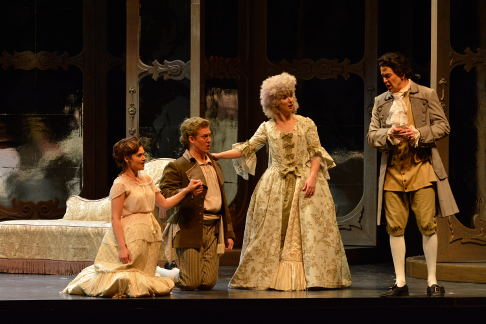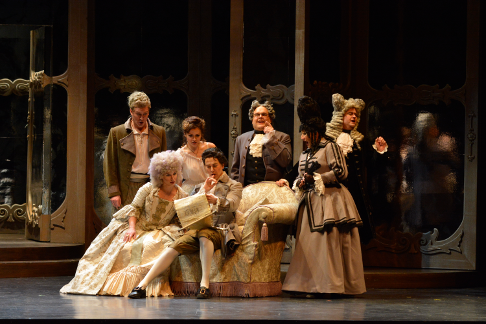30 Nov 2015
Le Nozze di Figaro, Manitoba Opera
To borrow from the great Bard himself: “the course of true love never did run smooth.”

To borrow from the great Bard himself: “the course of true love never did run smooth.”
However, it does make for a terrific night of madcapopera buffa as proven during Manitoba Opera’s 2015/16 season-opener of Mozart’s Le Nozze di Figaro ( The Marriage of Figaro).
Last staged by the 43-year old company in 2006, the four-act opera buffa based on Lorenzo Da Ponte’s Italian libretto is regarded among the top 10 operas performed worldwide. The three-hour plus production directed by MO newcomer Brent Krysa featured the Winnipeg Symphony Orchestra led by Tadeusz Biernacki (who also prepared the Manitoba Opera Chorus), as well as a dream team of accomplished Winnipeg-born sopranos.
The first of those is Andriana Chuchman, whose skyrocketing career has already taken her to the Metropolitan Opera house as well as seeing her gracing the stage with fabled Spanish tenor Plácido Domingo during her LA Opera debut this fall. An equally compelling actor who last appeared on the MO stage in 2011, Chuchman crafted a radiant Susanna with her Act III aria “Deh, vieni, non tardar” particularly showcasing her luminous, soaring vocals.

Charismatic local soprano Lara Ciekiewicz continues to prove her gifts as a natural stage chameleon, able to crack viewers up one moment with her razor sharp comic timing before breaking their hearts the next with her soulful performances — such as her MO debut as slave girl Liù in Turandot last April. Her two solos as the Countess Almaviva: “Porgi, Amor,” matched only by her later mesmerizing “Dove sono I bei momenti” did the latter, as she revealed the complex emotional underbelly of her deeply conflicted, all-too-human character.
Canadian bass-baritone Daniel Okulitch likewise dazzled with his swaggering portrayal of the skirt chasing Count who petulantly stomps his feet and wields large axes. His robust vocals, as displayed during his Act III recitative and aria “Hai già vinta la causa! ... Vedrò, mentr'io sospiro,” added brooding gravitas to the comic froth. His truly touching finale “Contessa perdono!” added its own grace note to the entire show.
Kudos to veteran mezzo-soprano Donnalynn Grills, grappling with real-life illness as housekeeper Marcellina. Singing mostly sotto voce, Grills’ strong acting chops helped sell her character for all she’s worth, aided by simpatico sidekicks Dr. Bartolo (baritone Peter McGillivray) and Don Basilio (tenor David Menzies) who valiantly rallied by her side in support.

Canadian bass-baritone Gordon Bintner (MO debut) created a convincing Figaro, including his “Non piu andrai farfollone amoroso” sung with military precision, with his portrayal noticeably growing more confident throughout the performance. He also received the night’s biggest guffaws after leaping into Grills’ waiting lap as his long-lost mother, later tossing off his tongue-twisting “Aprite un po’ quegli occhi” that earned cries of bravo.
Mezzo-soprano Alicia Woynarski (MO debut) created an admirably convincing male persona in the trouser role of page Cherubino, despite suffering minor intonation issues during “Non so piu cosa son.” Her later “Voi che sa pate” fared better, although her lovesick character mooning for women could have gone much further.
A highlight proved to be seeing now Toronto-based colouratura soprano Anne-Marie MacIntosh, a recent graduate from the University of Manitoba’s Desautels Faculty of Music marking her impressive MO debut as Barbarina. This rising star made every minute of her relatively short stage time count, including delivering a riveting “L'ho perduta, me meschina” under a starry night sky.
The stylish, albeit decidedly traditional production included ornate period costumes and effective sets originally created for Pacific Opera Victoria and Calgary Opera. Revolving mirrored door panels spun throughout the production at strategic moments captured designer Bill Williams’ flashing shards of light, adding to the overall, crazy funhouse atmosphere that’s a bit like love itself.
Holly Harris